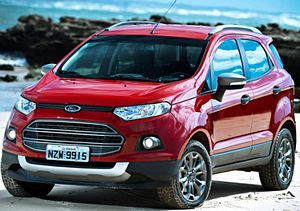|
By accessing or using The Crittenden Automotive Library™/CarsAndRacingStuff.com, you signify your agreement with the Terms of Use on our Legal Information page. Our Privacy Policy is also available there. |

Ford Are Confident About Our European Future
|
|---|
|
|
Ford Are Confident About Our European Future
Geoff Maxted
DriveWrite
September 17, 2013
You just can’t keep a good optimist down. Ford of Europe is adopting a tactic that their American parent company used during the 2008-09 recession in the USA. The company plan to bulk up its vehicle line-up as it awaits the European car market's recovery, according to Ford of Europe's head of product development, Barb Samardzich. Ford wants to be prepared to gain its full automotive share in a healthy Europe.
"It's the same exact strategy as in North America: to make sure that our portfolio is the best ever when the economy turns around," said Samardzich, who has been named Ford of Europe chief operating officer effective November this year.
Ford of Europe President Stephen Odell says Ford has upped its plans for portfolio expansion. In 2012, Ford said it would add fifteen vehicles in Europe in five years. Now it plans to add twenty five vehicles, Odell has stated.
He also said the twenty five will be line-up additions or new generations of vehicles but will not be variants. Samardzich, meanwhile, said the process is made simpler by the car maker’s One Ford drive for uniform platforms and power-trains globally. For instance, Ford moved the India-built EcoSport compact crossover into the European line-up in 18 months. The EcoSport will now be built in Russia, arriving in European showrooms late this year. Odell also reconfirmed Ford's determination to post a profit in Europe for 2015. He said Ford's move to cut 18% of production capacity, along with the addition of new product, will be key to the effort.
Quite by accident Ford’s position might be helped by the news that Angela Merkel, the German Chancellor, blocked a deal in June that would have set Europe's car industry an ambitious target to reduce CO2 emissions to 95g/km by 2020 from an 132.4g/km last year. Ostensibly this was to help German luxury car makers (there’s an election coming up) but a little relaxation of the pressure on manufacturers to conform to ever more stringent targets has got to aid everybody as they battle to maintain market share.

















 Topics: Ford Motor Company, Ford
Topics: Ford Motor Company, Ford

